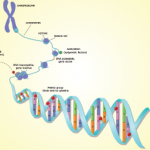Dr. Rao described how the researcher who predicted TET function, Dr. L. Aravind, PhD, of the National Center for Biotechnology Information, looked through the genomes of many organisms to find out what might modify the methylation state of cytosine. He started with the proteins JBP1 and JBP2, which are trypanosome enzymes that hydroxylate the methyl group of thymine, and based on similarity searches predicted that TET1, TET2 and TET3 would be methylcytosine oxidases rather than thymine oxidases.
The reason he predicted this was because TET1 and TET3 contained CXXC domains, which bind methylated dinucleotides with cytosine adjacent to guanine, which are exactly the sequences that become methylated at cytosine in mammalian genomes, Dr. Rao said.
Oxidized methylcytosines generated by TET proteins are intermediates in multiple pathways of DNA demethylation, Dr. Rao explained. They function to promote DNA demethylation, the process by which methyl groups are removed from 5mC. Five-methylcytosine inhibits gene transcription if it is present at gene promoters located at the beginning of genes.
In general, TET1 is expressed in mice embryonic stem cells, and TET2 also is expressed in embryonic stem cells but also in bone marrow and other differentiated tissues. TET3 is also highly expressed in the bone marrow, Dr. Rao said.
Several studies in mice have indicated that dysfunction of TET proteins can lead to cancer as a result of uncontrolled cell proliferation. Mutations in TET and a drop in 5hmC levels are also strongly associated with blood malignancies, solid tumors and other human cancers, according to many recent studies.
“What we have so far is that TET loss of function is strongly associated with human cancer,” Dr. Rao said.
She discussed data that linked TET2 and TET3 mutations in mice to leukemia, B cell lymphoma and other blood cell cancers. Loss of function of all three TET proteins in mice also appeared to play a part in testicular cancer, she said.
Research Continues
Dr. Rao’s lab is continuing to study how TET enzymes are involved in regulation of embryonic stem cell pluripotency and in preventing the cellular malfunctions that are associated with cancer. The research could one day provide new insights for cancer treatment through activation of TET enzymatic function, as well as improved generation of pluripotent stem cells for stem cell therapy and to understand complex diseases, such as neurodegeneration. the rheumatologist
Catherine Kolonko is a medical writer based in Oregon.


